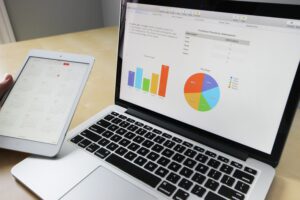Personal finance is defined by tools that can help to manage individual’s finances. It can consist of budgeting, banking, investment, savings and more. With the rise of FinTech, it not only helped businesses but also created products and tools that benefited individuals in managing their finances easily and efficiently.
Imagine yourself as a consumer, what do you do with your money? You spend, you save, you invest and even budget. These processes can be simplified with Personal Finance tools. Personal finance tools are referred to any types of tools that cater to finance-focused planning for individual consumers.
The rise of Personal Finance is also brought about by the increase in smartphone users. In 2022, the number of smartphone users globally is estimated to be more than 6 billion users which roughly translates to 83% of the world’s population. This significantly fuels the use and acceptance of such Personal Finance tools as they are easily accessible for the public. Consumers are starting to see the benefits of managing personal finance via digital platforms. It has seen an increase in interest in how FinTechs are starting to benefit individual FinTech consumers and to promote financial inclusivity on a global scale.
Examples of Personal Finance
As mentioned earlier, Personal Finance can encompass a variety of financial tools that help individuals effectively manage their finances.
Some examples of Personal Finance applications to help individuals in their journey by:
- Consolidation of debts
- Managing their finance
- Investing
- Comparing different financial product and improving financial literacy
Consolidation of Debts
Personal Finance apps like Debt Payoff Planner, Qoins, Mint and more help to reduce and eliminate your available debts. The method used can vary depending on the app. Some common ways to pay off debts via Personal Finance apps include payment planning, automated debt payoff and tracking and reducing expenditure. They work by organizing your debt to determining what you need to pay off and finally coming up with a feasible plan that you can stick to. They work by offering features that help to allocate your money into your debts, some apps can even link to your bank accounts to help you put money into your debt repayments.
Finance Management
Expense trackers like Singapore-based Planner Bee allows individual to manage their finances seamlessly by integrating the multiple bank accounts to keep track of your spending and budget. Besides being known for their finance blog, Seedly also offers an expense tracking app to help individuals break down their expenses and understand their spending habits.
Investing
Investing used to be difficult for amateurs as it was often associated with the idea of requiring a large amount of money to get started. However, an increasing number of robo-advisor platforms are coming into the market to break that stigma. Robo advisors like Stashaway, Syfe and Bambu help to pool the money invested by individual investors to help create a strong and diversified portfolios. This helps to significantly reduce the charges and allowing individuals to invest with a smaller sum of money.
Compare Financial Product and Improve Financial Literacy
Platforms like SingSaver, Moneysmart and more help individuals by sharing objective opinions on anything personal finance related. They are driven to help personal finance become accessible and to create a better financial future. They help to empower individual consumers into making better financial decisions by aggregating and consolidating product information to a single platform for comparison personalized to each of their unique consumer profile.
Advantages of Personal Finance
There are several proven advantages that Personal Finance tools can bring, and it has also seen a significant increase in popularity and adoption within consumers. Some of the advantages of Personal Finance include:
Improved Financial Literacy
Financial literacy is largely categorized in five main components – earning, spending, saving, borrowing and investing. With Personal Finance tools, it can help to improve financial literacy in individual consumers. These tools can enhance consumer’s financial journey and to improve financial journey in a sustainable manner. As Personal Finance tools are so easily accessible currently, it has helped
Efficiency and Convenience
With Personal Finance tools, it is meant to speed up any financial processes (investing, budgeting, saving) for individuals. It has made it easy for anyone in any phase of life to manage their finances. These Personal Finance tools are often made available via mobiles devices which allows them to access it whenever and wherever.
Productivity and Personalization
Personal Finance tools has made everything easily accessible via its app. For example, there are integrations available that allows Personal Finance tools to connect with your bank accounts which helps you to have an overview of your expenses and income. This helps individual to cut down a significant amount of time spent on consolidating the financial information. It also allows the Personal Finance tool to understand the financial information to provide a customized experience for the consumer.
Disadvantages of Personal Finance
While there are minimal downsides in using Personal Finance tools as they are meant to improve your financial habits and processes, there are technological risks that the app/tool can be vulnerable to. Like all FinTechs, Personal Finance tools are built with technologies which also translates to potential security issues and data breaches.
FinTechs are inevitable to be vulnerable to web and mobile app attacks. There are also several areas of concern with data privacy, as Personal Finance apps/tools would require individuals to share their personal information to offer a customized user experience. However, this can be minimized significantly with strong and experience Risk & Compliance professionals within your company who can quickly identify and prevent risks while ensuring that your processes are compliant to the regulations.
While technological risks and breaches are unlikely to be completely taken out of the picture, FinTechs can do their part in building trust with their consumers by establishing strong policies and adhering to them. The success of FinTechs are built on the trust due to its nature of products and services. Besides ensuring that you have a strong Risk and Compliance team in your company, companies can also utilize solutions that offer extra data privacy and cybersecurity.
How Storm2 Can Help
As the global FinTech talent marketplace, we strive to connect disruptive FinTechs to top FinTech talents to help companies scale. We are able to connect experienced Software Engineers and CTOs that can help scale and build the next FinTech app that will disrupt the industry and improve consumers’ financial well-being. Contact us now to find out how we can support you and your startup to success.










